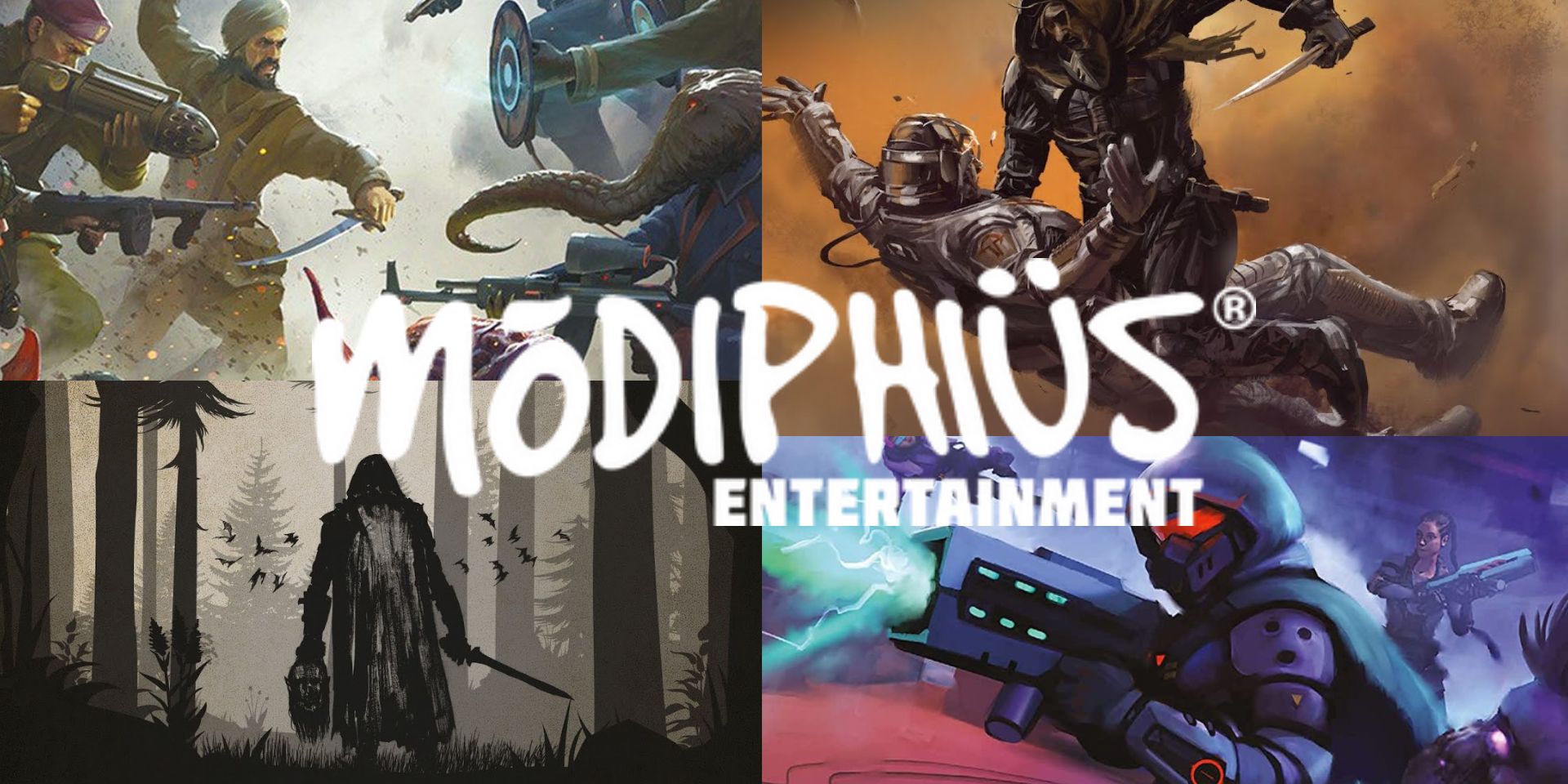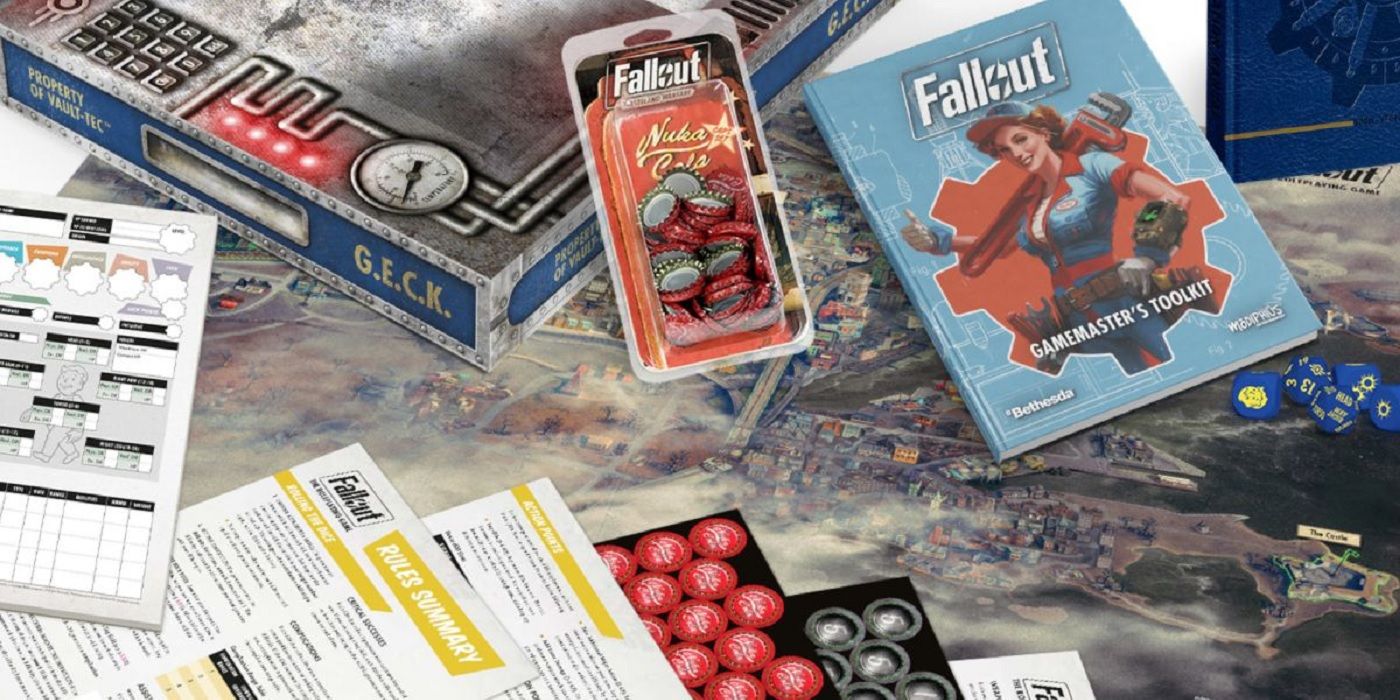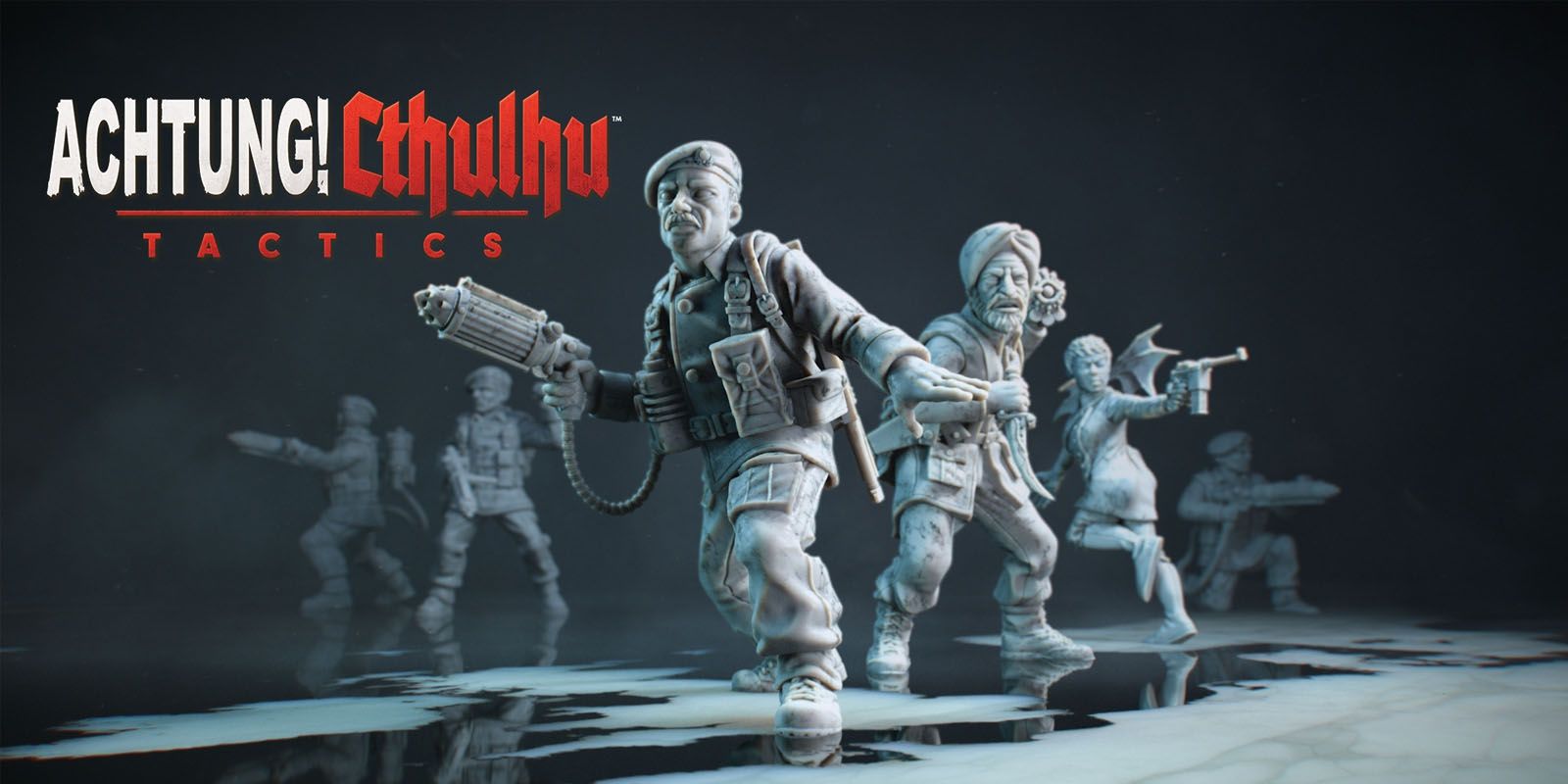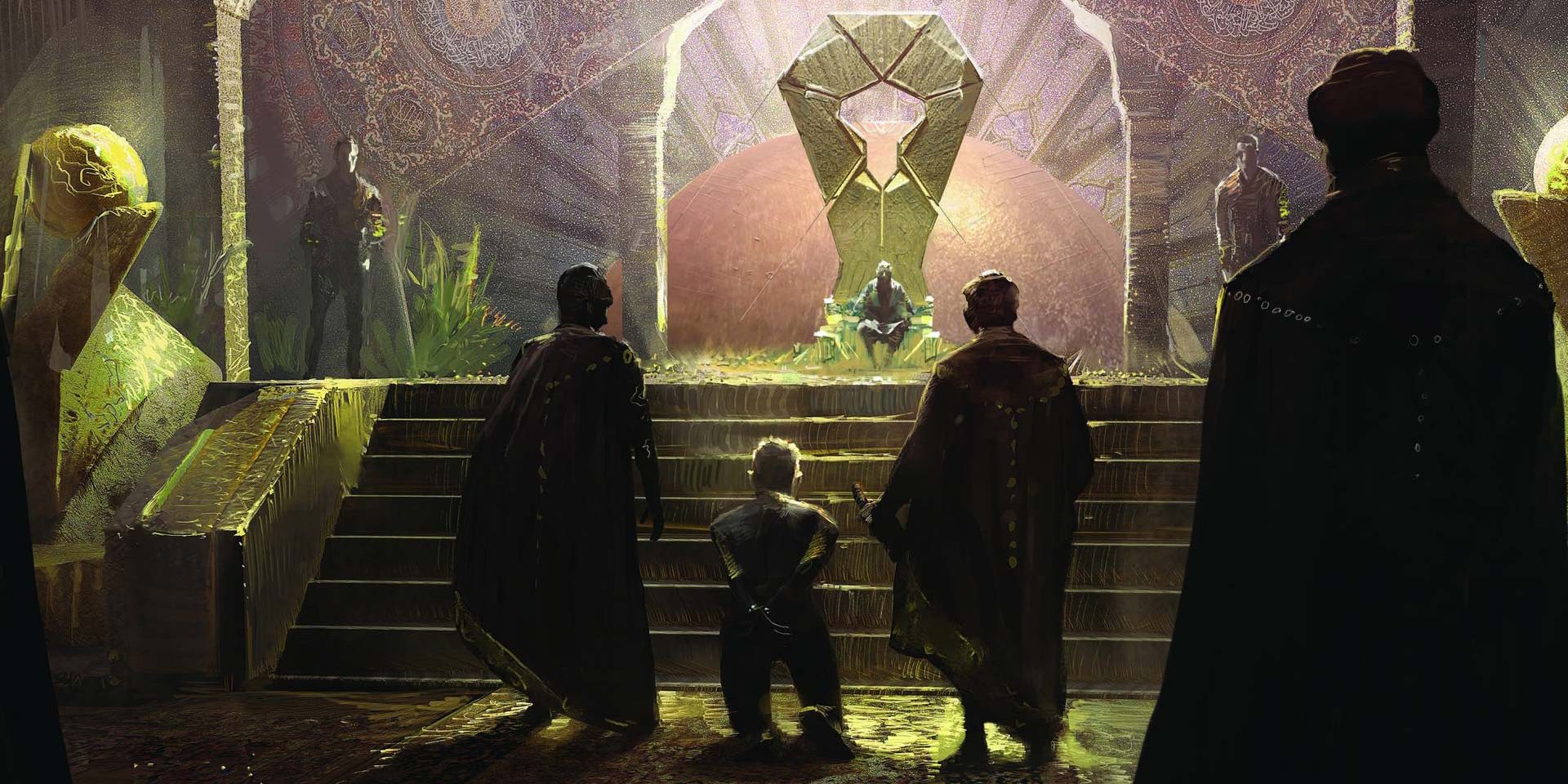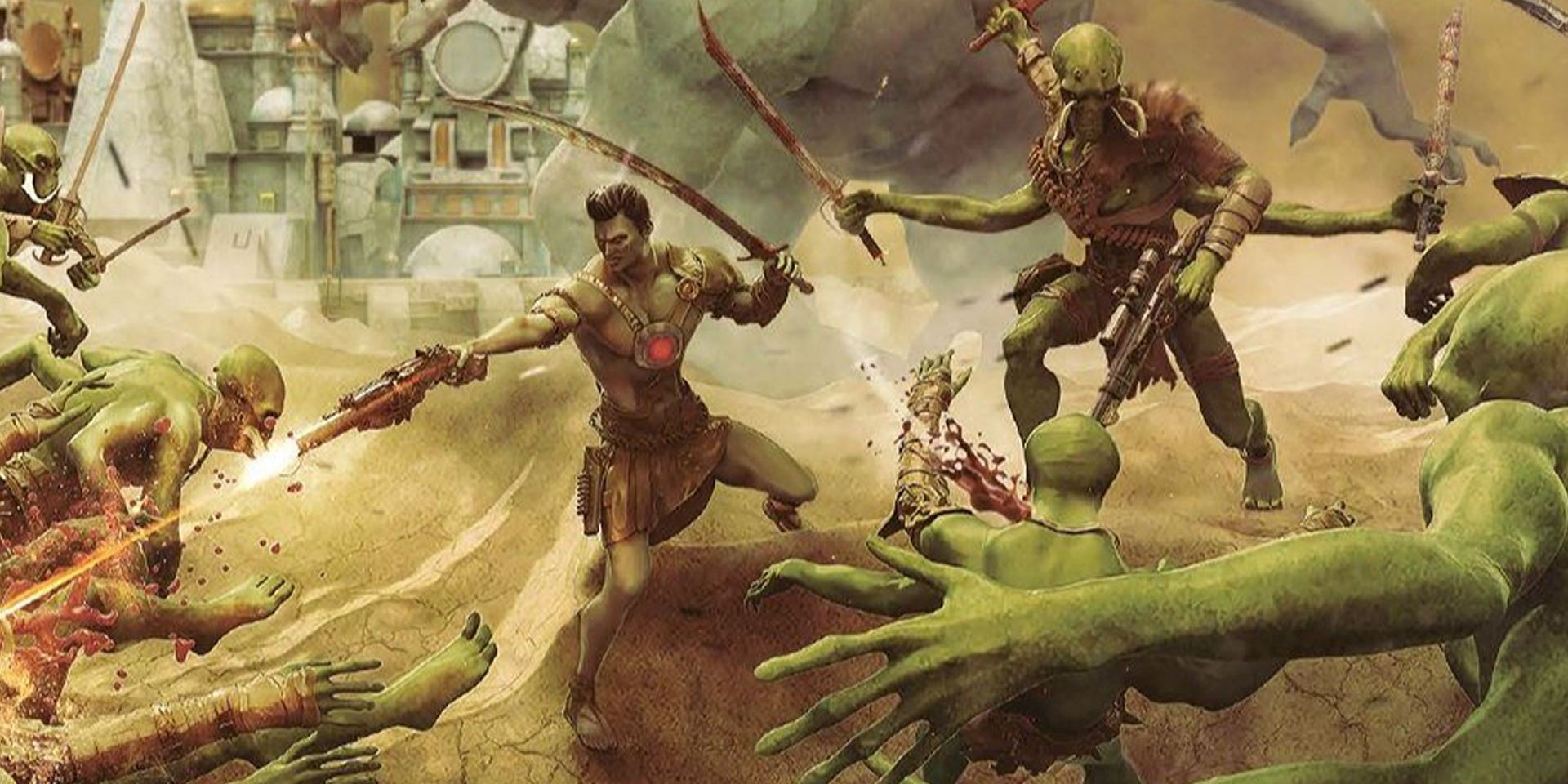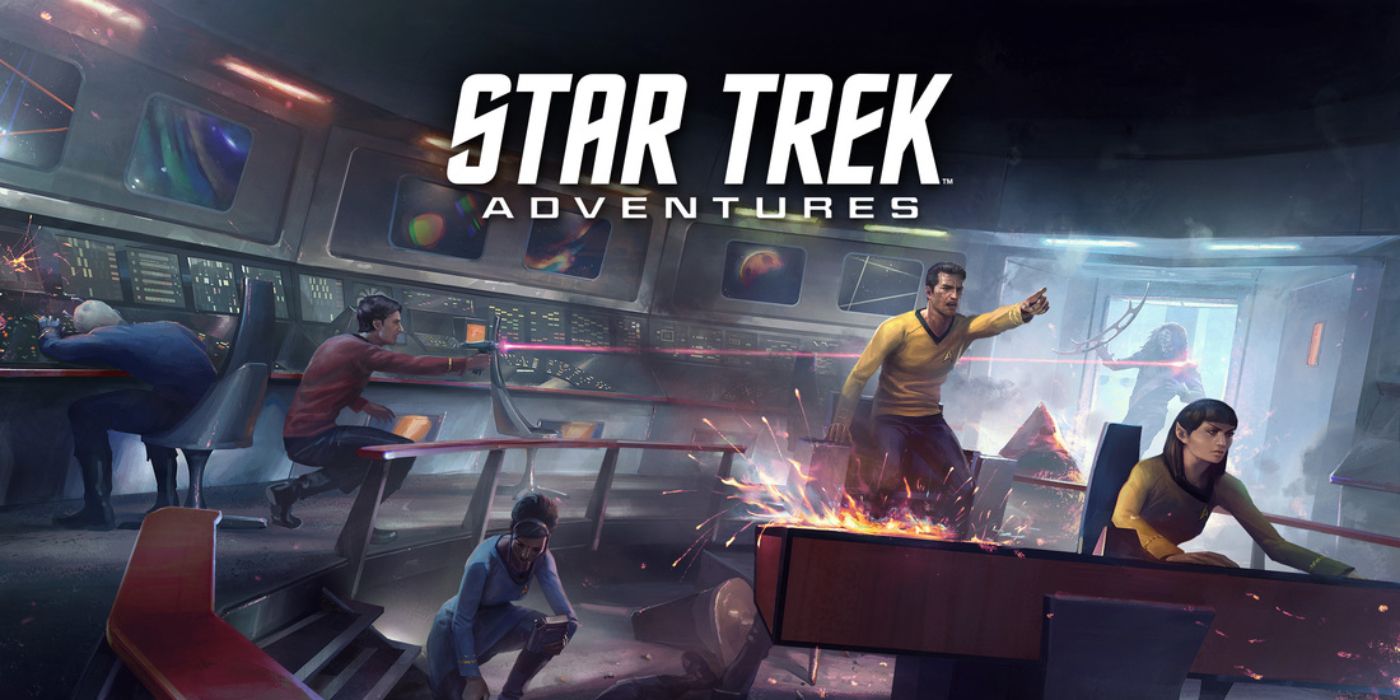Modiphius Entertainment, a game production company that's adapted franchises such as Star Trek, Fallout, and Conan The Barbarian into tabletop formats, recently set up a co-partnership program called VIA Modiphius, an initiative intended to help small-scale developers publish their innovative new tabletop game concepts and connect with new target audiences.
Modiphius Entertainment is a multi-faceted tabletop game company at present, not just publishing original-setting tabletop games, but also adapting famous sci-fi/fantasy franchises into RPGs and acting as a retail channel where third-party game developers such as Free League Publishing can sell and promote their games. Modiphius Entertainment's in-house "2d20" roleplaying system has been used as the basis for RPG adaptations such as Star Trek: Adventures, Fallout, and Dune: Adventures in the Imperium, plus their own original Achtung! Cthulhu pulp horror game – cinematic roleplaying games that put emphasis on telling tales of "heroism, adventure and courage."
According to the Modiphius website, their VIA Modiphius partnership program is a co-publishing and distribution service that supports "North American publishers looking for just European distribution, or smaller developers looking to get their first foothold in the global market," letting these third-parties make use of Modiphius Entertainment's own retail distribution channels, social media, and hard-earned tabletop game design experience. In an interview with Screen Rant, Chris Birch, the co-founder of Modiphius Entertainment (the other co-founder being his partner Rita), talked about the ins and outs of the VIA Modiphius program, the history of Modihpius as a tabletop game company, and his own personal thoughts on the challenges and possibilities of designing tabletop games:
Where did the company name “Modiphius” come from? It sounds vaguely like ancient Greek or Latin, or like Morpheus, the Greco-Roman god of dreams...
Chris Birch: "Modiphius" actually comes from a game world I created with a friend of mine. Me and Stuart used to sit around playing all kinds of War Games in in our 20s; we would sit up late into the night drinking diet coke and eating pizzas, dreaming up endless gaming worlds...and for one of them, we actually kind of made a full game rather than just [coming up with] lots of good ideas. It was called "Blaster Array," and it was set in a modified solar system re-engineered by an ancient race, that had pulled all the planets into position the sun; as a result, this solar system was called Modiphius, with this idea of it being derived from the word "modified."
We always thought we'd start a games company one day, and when I did, It was just a real no brainer, while coming up with the name of the company, to go, "I'm going to call it after that solar system." So that's how it came about. Rita, my wife and business partner, she's not a gamer, but she she liked the name as well.
So Rita's not into tabletop gaming?
Chris Birch: Yes and no? She's played Ticket to Ride. She likes the Agatha Christie card game that we've made [Agatha Christie – Death on the Cards]. So I would say she's a casual gamer that will play if we have a party or a dinner party of friends.
How did you personally get into tabletop gaming as a hobby, and what was the moment of truth that inspired you to go from playing these games to making and publishing these games?
Chris Birch: Well, when I was eight, I was quite shy as a kid. And every Wednesday, my brother, Nick – he's about 10 years older than me, so he was 18 – would go visit some friends of the family and play some games. And I think my mom one week said: "For goodness sake, will you take Chris with you and get them out of the house?" I wasn't into sports. I was just, you know, playing my Atari consoles. So he dragged me off to the Sylvesters', where these friends of ours would run a game of Dungeons and Dragons (this was the late 70s, when D&D was very big).
I remember playing a Dungeon & Dragons adventure called In Search Of The Unknown, where there's this pit-trap at the end of the first dungeon corridor. Because I was the little brother, they gave me a free suit of plate mail armor for my Fighter character – which you should always be suspicious of, if you're a new player – and I fell into the pit trap. The DM was trying to be nice, so he gave me three different saving throws to save myself and get the armor off after I fell into the water. I failed every time and died. So I died in my first [roleplaying] game ever; I was so traumatized at the death of my character, who was called Brandon Carter. Ever since, in every video game I've played, I make a character called Brandon Carter, and in every game I've been involved in, I put a character called Brandon Carter into one of the beginning sample chapters.
Oh. So your interest in tabletop gaming as a hobby was birthed from betrayal!
Chris Birch: Well, yeah, from the drowning trauma.
Afterwards I discovered a little hex war game called Ogre in a knitting shop. This was maybe a couple of years later. I was with my mother, we'd gone to see her sister who ran a cattery. I'm allergic to cats, so [going to a cattery is] a bit like saying "would you like to have really bad flu for the weekend?" So we got out of the house one day and walked around this village, I was really bored – as as a 10 year old kid traveling around would be – and was dragged into a knitting shop. Maybe it was an art shop? At the back I found this little rack of boxes that had fantasy monsters and spaceships and stuff on the covers. And I discovered this thing with a big massive tank called Ogre. I pleaded with my mum to buy it, and spent the weekend scratching my head over its combat rules, because I wasn't great at maths; the game probably helped me [with that], actually. I fell in love with this crazy little game of hex combat and pleaded with my other brother – who's 11 years older – to play it with me anytime he could. Then I discovered that there was a whole world of these "fantasy games." So through my teenage years, I would play lots of war games. and create my own rules for war games.
When I came to London, I was working in the music business, so I was doing big techno parties till 10 in the morning, then get up, go and see my friend Stuart, and play war games in the afternoons. That's why we probably ended up staying up so late because I was used to being up late all night. Then I eventually fell in with the Cubicle Seven crowd and helped them get the rights to Doctor Who. I pitched them the idea of a roleplaying game based on Starblazer Advntures – a British comic that preceded 2000 AD that had one whole story in black and white and beautiful Chris Foster color covers. They said: "what a great idea! Why don't you write it?" So I spent the best part about three years with Stuart, my friend, writing up this role playing game that did all right. Wasn't going to pay me full time, so I carried on with my current job, which was starting and running a fashion company based on video games called Joystick Junkies.
After about 13 years, I met my lovely wife, Rita. Long story short, she said: "You could be doing better than this. If you're not happy, why don't you do whatever you love?" I realized that what I loved was tabletop games, and Kickstarter came along, which showed that you could actually make some money. To create a tabletop game, you didn't have to spend your hard earned savings. So we we launched the Kickstarter for Achtung! Cthulhu, which is our Mythos horror world or universe. We thought we'd make about $10,000 to pay for a book, and we took in over a quarter of a million dollars. Modiphius as a company was born because we were like, "I'm going to have to be full time if I'm going to deliver this, so let's just start a company, jump off the cliff and not look back." And that's how we started. Rita (she'd been working on a charity at the time) was kind enough move to London with me and started doing everything that I couldn't do or didn't have time to do – customer support, emailing press and all sorts of people and anything to help out and we built the company for them.
It sounds like you two have a very complementary relationship.
Chris Birch: Yes, absolutely. We wouldn't be here without her.
Achtung! Cthulhu, the RPG setting that put Modiphius Entertainment on the map, blends classic Lovecraftian cosmic horror with World War II pulp adventure. Who came up with the core concepts behind Achtung! Cthulhu?
Chris Birch: So when I was a kid, I would help my grandfather out at their comic book and secondhand bookstore. I would go there on Saturdays and get paid in bagfuls of comics – old Spider Man comics, Fantastic Four, Weird War and Sergeant Rock. I loved toy soldiers as a kid (and I still love, you know, World War Two, model tanks and toy soldiers). I also loved these crazy stories of demon infested tanks and brave allied heroes, fighting the vampire, Nazis, and whatever. Jump forward in time to when I got back into gaming; I'd been working on Starblazer Adventures when I got introduced to HP Lovecraft and his story At The Mountains Of Madness, which is about discovering some ancient ruins – hundreds of millions of years old – in Antarctica. I loved Weird War stuff and was like: "what if there were Nazis in the Mountains of Madness and there was a battle in those ancient ruins with, you know, heroes and soldiers fighting over it?"
We came up with name Achtung! Cthulhu, since we were basically setting the Cthulhu Mythos in World War Two. Since I was going to do a Kickstarter, I was also thinking about what would give me the most chances of success. World War Two was very popular. Call of Cthulhu was very popular. We got the rights to the rule system for the Call of Cthulhu RPG [published by Chaosium Inc.], which, you know, is very dangerous and serious; you can't run through gunfire in that system. Then we got the rights to the Savage Worlds system, since there's a whole other audience that would like more pulpy, fun adventures. It's quite good, you know, to reach two totally different audiences with the same game world. I had written out some concepts for the world when I met Sarah Newton, who had made a "Weird War" set of adventures with a Cthulhu theme in World War Two. I said: "Look, why don't we set them in this world?" And so we put them out there and those were our first two products. We never looked back.
The newest edition of Achtung! Cthulhu, and other licensed Modiphius tabletop RPGs such as Dune: Adventures In The Imperium and Star Trek: Adventures, use an in-house "2d20" roleplaying system. What was the inspiration behind this "2d20" system, and what sort of stories was it originally designed to tell?
Chris Birch: When we designed the Mutant Chronicles game, we wanted to create our own rule system because core books always sell five times more than supplements. Every time we sold an Achtung! Cthulhu book, we had to hope there was someone nearby selling a Call of Cthulhu core book; sales of Achtung! Cthulhu were limited to gamers who had that book or access to that book. Having our own game system meant we could sell a lot more books, which we did.
We wanted the dice-rolling rules in the 2d20 system to be accessible – rules D&D players wouldn't feel too alienated by. But we also want it to be way more cinematic. We have things in the 2d20 system that are similar to Aspects from FATE, and there are things inspired by ideas from Numenera and Savage Worlds. I've always said there's nothing unique in the game system; it's just a whole bunch of good ideas thrown together. I wanted a system where people could say: "I want to jump around the pillar, smack the guy in the face and dive out the window," so that's what we created. So yes, there's inspiration from lot of games in the 2d20 system because I've played so many different gaming systems over the years that you kind of, you know, there's lots of great ideas out there.
What inspired Modiphius Entertainment to help small-scale game studios publish and promote their tabletop games, and how will the new VIA Modiphius co-publishing and distribution program further Modiphius's efforts to give interesting tabletop games and their developers a leg up?
Chris Birch: I ran a fashion label for 13 years; we made really cool T shirts, and well, streetwear designs inspired by video games, but it wasn't obviously stuff that was really unique and groundbreaking. I wanted to do the same thing with tabletop games – that is, do innovative stuff. There's plenty of people out there doing innovative stuff who might find it very hard to get their products into distribution chains, and we have all the tools, systems, and marketing channels needed to get great products out there and make them look better.
A good example is Five Parsecs From Home, which is a very clever procedurally generated adventure war game where you create a crew of characters and complete missions as you go from planet to planet; the story unfolds as you play, and it's solo and co-op game, which I'm a really big fan of. The original version [of Five Parsecs From Home] was a very simple PDF with a very basic layout that wasn't likely going to excite a fanbase. So I went to Ivan, the creator, and said: "Look, why don't we create a really cool resale version? We'll front the cost for the artwork, help you get it made, and, of course, give you royalties for sales. We'll handle the editing layout production, you just write the rules for a new edition." We did the same thing with Rangers Of Shadow Deep, a solo fantasy war game that was already a big hit on DriveThru RPG; we basically brought that book with a new layout and some errata to the retailers. Ultimately, VIA Modiphius is a vehicle for finding cool, innovative products and getting them in front of a bigger audience that they deserve to be in front of.
What qualities do the folks in VIA Modiphius look for when they seek out new tabletop RPGs, boards games, or war-games to co-publish? Are they looking for cool new ideas? Solid designs? A blend of both?
Chris Birch: I often look for interesting War Games, because I have a particular interest in war games where there are solo or cooperative mechanics. I'm looking for innovative narrative systems where the game brings the storyline to the forefront through mechanics. Anyone can play a war game and say "the reason we're playing this is because I captured the princess and you need to rescue her," but a lot of the time, it's still just a bunch of forces lining up and fighting until someone wins.
What I want is for the actual mechanics of the game to reward me. I want to have more fun losing the battle. I want to be incentivized to follow the story rather than following the game's objectives, though obviously you still want to be able to roll dice and kill monsters or attack units. I look for projects that are exploring new ideas through their design, where it's not just about the fighting. In Five Parsecs From Home, the battles are fun, but when you finish a battle, you find stuff, and then discover that some enemies found out where you are, and you're trying to find a job, and you're trying to pay off a loan for your spaceship...it's almost like a solo role playing game experience, but super simple. I look for people who are exploring those kinds of innovative ideas. I'm a big believer in working with other creatives who often have much better ideas than you.
Earlier, you talked about using Kickstarter to fund and promote Modiphius's first RPG setting, Achtung! Cthulhu. When Modiphius launches a new Kickstarter drive for one of their tabletop projects, do have any special playbooks for presenting their games and getting gamers interested?
Chris Birch: You're getting into marketing territory there. When promoting a game, you need to answer questions like "Who is the customer? What is the customer's problem? What are you trying to solve with this game?"
I try and sell people with a world that they would want to explore, and I think one of the problems with game design is people often go: "what would it be like if we created a world where all the animals could talk, and they're fighting wars against each other in a kind of medieval world?" That's cool, but what makes a great story is the people who are in that story. A great story starts with the hero, the heroine, the protagonist, the enemies, and their own; after making those characters, I build their world around them, because if I care about them, I'll fall in love with the world. So that's something I try and get across when we're selling a new world – showing off th actual characters that you're going to follow in that world, so that you'll want to play a character like them.
In Star Wars RPGs, for instance, no one ever wants to really role play as Han Solo and Luke Skywalker. You want to be your own rebel, but you're inspired to be a rebel because you love the stories of Han Solo and Luke Skywalker and Princess Leia. You want to be someone in their world – you don't want to be them, but you want to tell your own story in their world. You've got to sell people on the world, on the experience, but also in the mechanics.
When designing game mechanics, you need to ask question like: is this a game where you can have up to eight players and have an amazing time? Can you play this game fo hundreds of hours? Can you replay this game multiple times? Can you play and enjoy this game in just 30 minutes, or anytime you want? There's a lot of problems that people try and solve with games and many different types of people you're pitching it to. So what we highlight for our games does depend on the game in question. And of course, I hope that people know that anything we do is going to be, you know, well designed quality products. That goes without saying, really.
They say that to become a talented writer, you need to read a lot of books and write stories every day. Do you think a similar principle applies for tabletop game design?
Chris Birch: Oh, yes: you should read a lot of role playing game books so you don't go around claiming that you've created the "ultimate game" that no one's ever thought of, because it's probably been done before. It's good to be well read, to see how other people designed their roleplaying systems. What you read depends if you're designing a system or if you're designing the world. If you're a world builder, it's good to read other people's worlds and see how they constructed a role playing settings, but you should also read great fiction. Because like I said, a lot of gaming worlds aren't very well thought out, and I think characters drive roleplaying, not the premise for a world.
It's really important to have very, very strong characters that you want to be or that you want to see in a game's world. So you should read good fiction and watch good movies in the genre you're interested in. Learn about storytelling, learn about good game design, and see how other games have done it. Sometimes there's like, a gem of something genius in a game, even if the rest of it is not very good. But you kind of pick up all those things as you go. So it's great. It's just like language: the more words you you read, the more words you can speak and the more games you read, the more information you have in your brain that you can reconstitute into interesting game mechanics.
Somewhere in the world, there's a fan or player of tabletop games who just came up with a cool game concept with cool characters and wants to build it up into something other people would enjoy. What would you tell that person to do next, if you could speak to them right now?
Chris Birch: I would say write it up in a PDF using Word, make it look half decent with a bit of your own layout wok, and stick it out there on DriveThru RPG. It doesn't matter how bad it is; just get it out. If you can afford a bit of artwork, or you can afford someone to do some nice layout work, or teach yourself layout to make it look half decent, that's a plus...but get it out there, don't worry about it too much. Your first few games will be terrible, but you'll learn from them and gradually build a following of people who like what you do.
It's just like when you're a writer; you just got to write books, and your first books will be terrible. You've just got to exercise that muscle, use it again and again and again. You have to focus on it and work hard. And that means, you know, not necessarily going out every night partying or playing football every Saturday. If you're going to be a writer or games designer, you've got to commit serious time to it. Read about what other people are doing. Get advice, talk to everyone you can in the industry, get advice from people, but but more importantly, just get on and do it. Don't procrastinate, thinking "it's not ready" or "I'm not ready," or "this isn't good enough yet." Just stick it out there. It can be for sale. It can be free. It's just about getting it in front of people and getting commentary on your language or the way you design your storylines. Your first few probably won't be your magnum opus, so focus on the idea that everything is practice, everything is an example of what you could do, everything is a way to build experience.
Is there a soon to be released Modiphius RPG, board game, or war game you're personally very excited about?
Chris Birch: So I'm working on two for next year. I can't really talk about them yet, but they'll be built around the 2d20 system. It's our first time doing a new IP of our own that's not a licensed role playing game world. They're both coming out next year. One is written and is going into editing soon, and is a prequel to Achtung! Cthulhu set in the same universe. The other is a totally different universe. Both do quite innovative things with the 2d20 system; we're constantly exploring what we can do with that. As far as exciting ideas goes, my big thing is I want people to be able to literally open the book and start playing right now. I don't ever want to hear: "Sorry, guys. I've got to read the character creation chapter." I want everyone to be able to sit around the table and just start reading and playing. So that's that's my big thing.
Returning to the topic of VIA Modiphius, are there any soon-to-be released co-published games you'd like to give a shout-out to?
Chris Birch: Oh, for sure! So we've got Five Leagues From the Borderlands, which is the fantasy version of Five Parsecs From Home, coming out very soon. It's a procedurally generated solo and cooperative fantasy campaign where you have six adventurers and you are gradually saving various villages, clearing out the area, and there's all sorts of plots building up around you and different enemies. It's designed to be played with any miniatures you've got. We also have another upcoming game called Battle Space, which is a modern day solo and co-op military miniatures game where again, you have squads of soldiers sent on missions. You might be US Marines, you might be Spetsnaz, you might be British commandos, you might be CIA, you might be FBI fighting a strange cult. It's fast and brutal and very hard. Pre-orders for both these games will be coming up in the next month or two.
To learn more about Modiphius tabletop games such as the Fallout RPG or co-published tabletop games like Five Leagues From the Borderlands, visit the Modiphius Entertainment website here.

